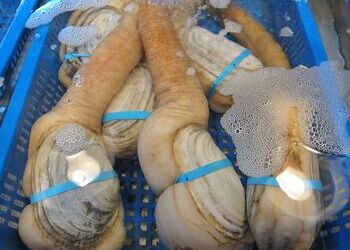Mexican geoduck clam populations are suffering as legal harvests are threatened by rampant poaching, which has driven the species onto the endangered species list.
The legal geoduck clam industry is steadily being pushed out by poachers who operate with little fear of repercussion, according to La Jornada, quoting Mexico’s chamber of commerce for fisheries (Canainpesca). At the same time, Mexican fishing authorities assert that the clam’s status as a luxury seafood dish in Asian markets is fueling a perhaps irreversible decline.
SEE ALSO: Latin America’s Bustling Trade in Seahorses to China
Sergio Guevara Escamilla, Canainpesca’s representative in the northwestern state of Baja California, blamed “a network of corruption” threatening the livelihoods of hundreds of families to fuel the demand for this seafood dish in Asian markets.
To curb exploitation, the Mexican government announced temporary moratoriums on fishing the clams every year. These ran from April 16-30, 2021, and will take place from January 25 to April 30 in the years to come.
Illegal, Unreported and Unregulated (IUU) fishing has ravaged northwestern Mexico, making the clam one of the most threatened marine species in the region.
InSight Crime Analysis
While numerous other marine species in Mexico have been threatened, the speed at which the geoduck clam has been overexploited is alarming. First discovered in the Gulf of California in the 1990s, the clam’s harvesting regulation has only been in place since 2007.
Its price in Mexico can reach $40 a kilogram and a single geoduck clam can fetch as high as $300 in high-end restaurants in China, according to the BBC. It is also legally produced in the United States and China, with 90 percent of clams going to China.
SEE ALSO: Coronavirus Has Not Slowed Looting of Latin America’s Maritime Species
The same goes for Mexico. “More than 90 percent of the production is exported to Asia, where introducers have no qualms about receiving the illegal product, especially at a price lower than the market price,” Guevara Escamilla told La Jornada.
The Mexican navy has worked to stem the flow of illegally sourced clams to international markets, making regular seizures of geoduck clams alongside sea cucumbers, lobsters, abalone and other seafood.

